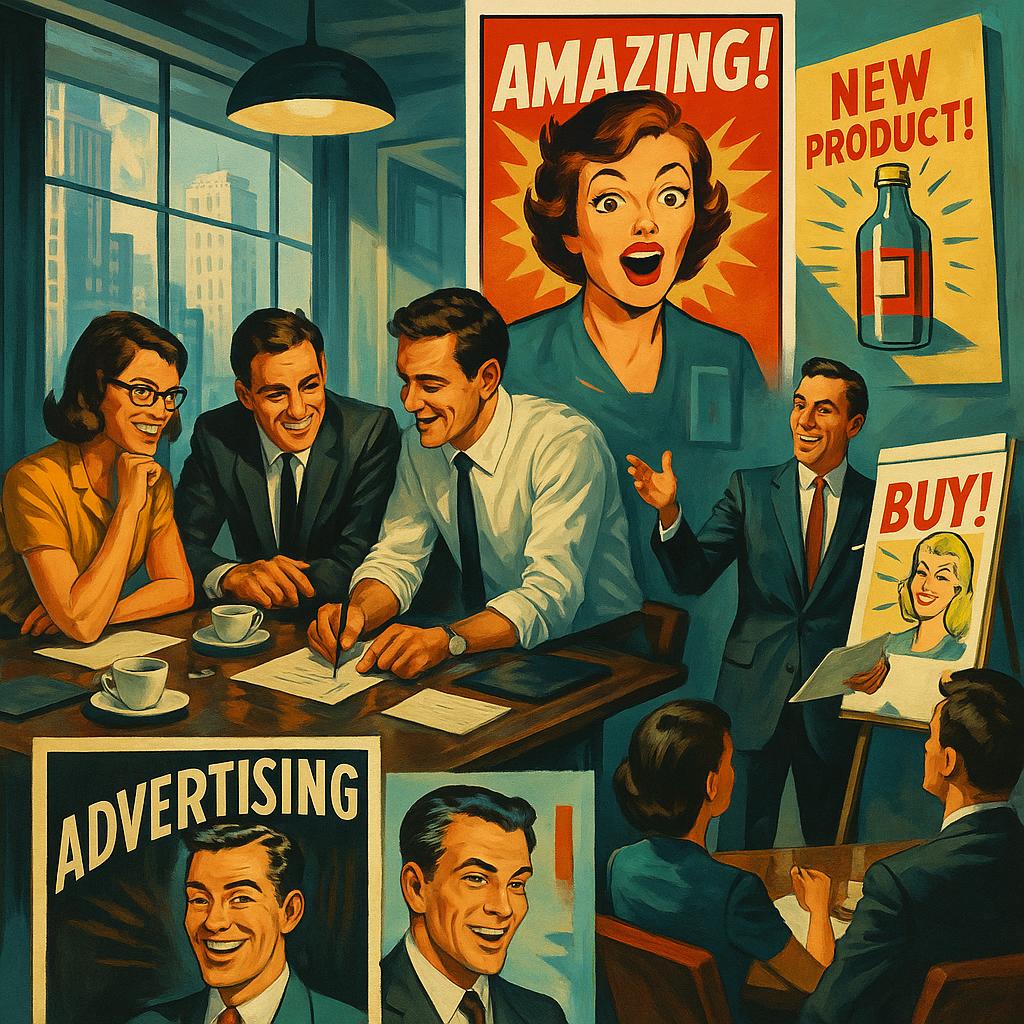The world of advertising and marketing has inspired numerous legendary films and series.
With entertaining stories and unforgettable characters, they help explain how ads are made and why they influence so much of what people think and buy. They make it clear there’s a lot more to advertising than catchy slogans and flashy commercials.
We bring you a list of movies and TV shows that give viewers an inside look at how the industry works, who drives its ideas, and what happens when ethics and ambition collide.
Mad Men: The Golden Age of Advertising
Set in the 1960s New York, Mad Men centers around Don Draper, a brilliant and enigmatic creative director at the Sterling Cooper advertising agency, played by Jon Hamm.
At work, Draper leads the creative team through major advertising campaigns for well-known brands, all while maintaining his own secretive and turbulent personal life. The show weaves Don’s story with that of Peggy Olson (Elisabeth Moss), one of the first female copywriters striving to break through a male-dominated industry, and Roger Sterling (John Slattery), a charming partner in the firm who brings both comic relief and sharp business acumen.
Mad Men explores the rise of modern advertising as the team grapples with changing social norms, shifting consumer expectations, and the ethical dilemmas inherent in crafting persuasive messaging.
Thank You for Smoking: Satire in Marketing
Thank You for Smoking follows Nick Naylor (Aaron Eckhart), a charismatic and quick-witted spokesman for the Academy of Tobacco Studies. Tasked with defending the image of Big Tobacco, Nick excels at turning even the harshest criticism into compelling arguments through skillful spin and clever public relations tactics. He handles high-stakes talk shows, congressional hearings, and adversarial press, always finding a way to justify and glamorize smoking.
Nick interacts with industry figures like Polly Bailey (Maria Bello), who advocates for alcohol, and Bobby Jay Bliss (David Koechner), who represents firearms. They form a satirical “M.O.D. Squad” (Merchants of Death) that trades lobbying tactics. J.K. Simmons plays Nick’s stern boss, who adds further pressure to uphold the company’s interests at any cost.
As Nick’s career soars, the film reveals the consequences of manipulating facts. It shows how persuasive messaging can influence everyday decisions and challenge personal integrity.
99 Francs (€14.99): The Dark Side of Advertising
This French film centers on Octave Parango, a talented copywriter at a flashy Parisian advertising agency. Played by Jean Dujardin, Octave is at the peak of his creative powers but growing ever more cynical about the world of advertising. The film looks into his daily life as he crafts bold and beautiful campaigns that mask products’ flaws. Behind the scenes, he rebels against the hypocrisy and superficiality around him.
Octave struggles with artistic integrity and personal disillusionment, and escapades both in and out of the office. He spirals through substance-fueled nights and confronts agency corruption, while the pressures of the industry start to weigh heavily on him and his colleagues.
The narrative brings into focus the psychological strain on those tasked with constantly inventing new ways to deceive consumers. It presents an unsettling portrait of the darker realities behind the industry’s glossy façade.
The Joneses: Selling a Lifestyle
The Joneses centers on a seemingly perfect family. Steve (David Duchovny), Kate (Demi Moore), Jenn (Amber Heard), and Mick (Ben Hollingsworth) move into an upscale suburban neighborhood and instantly captivate their neighbors with their luxurious lifestyle. However, they are are actually stealth marketers, hired by a marketing firm to promote and sell high-end products through carefully crafted appearances and social influence.
Each aspect of their daily lives, from what they wear to how they entertain, is part of a larger campaign aimed at sparking consumer envy and driving sales in the community. As the story progresses, internal pressures mount, especially for Steve, who questions the morality of deceiving their new friends.
The film exposes the pervasive impact of aspirational marketing and product placement. It highlights how these tactics can foster unrealistic ideals, disrupt authentic relationships, and blur the lines between genuine connection and commercial manipulation.
Emily in Paris: Social Media and Branding
Emily in Paris follows Emily Cooper (Lily Collins), a young American marketing executive who lands a job at a prestigious Parisian firm. With limited French skills and cultural knowledge, Emily is tasked with introducing an “American perspective” to European clients in the highly competitive worlds of luxury, fashion, and hospitality.
Her innovative use of social media, especially Instagram, turns heads: she earns praise from some colleagues and frustration from others. Key characters include Emily’s traditional boss Sylvie (Philippine Leroy-Beaulieu) and her supportive friend Mindy (Ashley Park), who encourages Emily to explore Paris.
The series depicts modern marketing: influencer partnerships, viral content, and the importance of brand image. Through Emily’s professional challenges and personal adventures, the show explores how today’s marketers blend creative digital strategies with cultural adaptation.
Crazy People: Truth in Advertising
Crazy People tells the story of Emory Leeson, an advertising executive played by Dudley Moore whose burnout and frustration with the industry’s deceptive messaging lead to a mental breakdown. He starts to create brutally honest ads that forgo all the usual marketing fluff.
Sent to a psychiatric hospital after his breakdown, Emory connects with an eccentric group of fellow patients (portrayed by Daryl Hannah and Paul Reiser). Together, they launch a series of blunt ad campaigns that unexpectedly seize the public’s attention. As Emory faces mounting resistance from his agency and conflicted clients, the film explores the risks and rewards of selling truth over illusion.
Through humor and sharp satire, Crazy People brings a new perspective on the pressures faced by those in advertising. It questions whether authenticity and candor can truly succeed in a field built on persuasion and spin.
The Crazy Ones: Agency Life and Innovation
Another piece with “crazy” in the title, this is a workplace comedy set in the offices of Lewis, Roberts & Roberts, a top Chicago advertising agency. Robin Williams stars as Simon Roberts, a legendary, unconventional creative director, whose unpredictable ideas keep clients and coworkers on their toes. Sarah Michelle Gellar plays his daughter Sydney, the agency’s organized creative director tasked with managing her father’s antics and ensuring campaigns run smoothly.
The series depicts their dynamic as they lead a quirky team: Zach (James Wolk), the charming copywriter; Andrew (Hamish Linklater), the neurotic art director; and Lauren (Amanda Setton), the witty assistant. Each episode spotlights the excitement of the creative process, such as brainstorming and last-minute changes.
By portraying the challenges of balancing creativity with business needs, The Crazy Ones offers a fun and insightful view into agency life and the art of persuasive advertising.
What Women Want: Understanding the Audience
What Women Want follows Nick Marshall (Mel Gibson), a confident Chicago advertising executive known for his macho outlook. His world shifts when Darcy McGuire (Helen Hunt) joins the agency as his new boss, tasked with helping the company reach female consumers. After a freak accident, Nick discovers he can hear women’s thoughts, a skill he quickly leverages to gain workplace advantage and create more effective, empathetic ad campaigns.
As Nick uses his ability, he confronts ethical dilemmas about privacy and comes to appreciate the complexity of women’s perspectives. His life is further complicated by a growing connection with Darcy, pushing him to rethink his own biases.
The film uses humor and romance to show the importance of understanding one’s audience in advertising. It reveals how empathy and genuine human connection are vital for meaningful marketing.
Trust Me: Behind the Scenes of Ad Agencies
This TV series focuses on two creative executives at a Chicago advertising agency: Mason McGuire (Eric McCormack), a practical copywriter, and Conner (Tom Cavanagh), his daring art director partner. The series depicts their daily battles to pitch winning ideas, meet client demands, and cope with the emotional toll of relentless deadlines.
Supporting characters, such as ambitious account executive Sarah Krajicek-Hunter (Monica Potter), add depth to the agency environment. Trust Me authentically portrays the marketing and advertising industry by highlighting professional rivalries and creative struggles. The show reveals how balancing creativity with business realities often leads to both ethical dilemmas and moments of genuine triumph in the competitive world of advertising.
They Live: Subliminal Messaging in Media
Directed by John Carpenter and starring Roddy Piper, They Live presents a provocative and dystopian lens on the world of marketing and advertising. The story centers on Nada (Piper), a down-on-his-luck drifter who stumbles upon a pair of mysterious sunglasses. When he puts them on, he is shocked to see that the world around him is not as it seems. Ordinary billboards, magazines, and TV broadcasts are suddenly exposed as vehicles for subliminal commands such as “Obey,” “Consume,” and “Conform” – messages invisible to the naked eye.
Even more unsettling, Nada realizes that many influential people in society are actually aliens in disguise, using these hidden signals to manipulate humans and maintain control over the population. As Nada teams up with another drifter, Frank Armitage (played by Keith David), the two unravel the extent of the alien occupation and their grip on the media and marketing channels.
They Live critiques the real-world potential of advertising to shape thought and behavior on a subconscious level. As such, it sparks reflection about the ethics and influence of pervasive media messaging.
Liked this article? Try Stryng for free. It’s the AI platform that helped write it. You can also contact the Stryng team if you need great content for your marketing.



